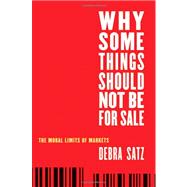
What is included with this book?
| Acknowledgments | p. ix |
| Introduction | p. 3 |
| Part I | |
| What Do Markets Do? | p. 15 |
| Part II | |
| The Changing Visions of Economics | p. 39 |
| The Market's Place and Scope in Contemporary Egalitarian Political Theory | p. 63 |
| Noxious Markets | p. 91 |
| Part III | |
| Markets in Women's Reproductive Labor | p. 115 |
| Markets in Women's Sexual Labor | p. 135 |
| Child Labor: A Normative Perspective | p. 155 |
| Voluntary Slavery and the Limits of the Market | p. 171 |
| Ethical Issues in the Supply and Demand of Human Kidneys | p. 189 |
| Conclusion | p. 207 |
| Notes | p. 211 |
| Bibliography | p. 237 |
| Index | p. 249 |
| Table of Contents provided by Ingram. All Rights Reserved. |
The New copy of this book will include any supplemental materials advertised. Please check the title of the book to determine if it should include any access cards, study guides, lab manuals, CDs, etc.
The Used, Rental and eBook copies of this book are not guaranteed to include any supplemental materials. Typically, only the book itself is included. This is true even if the title states it includes any access cards, study guides, lab manuals, CDs, etc.